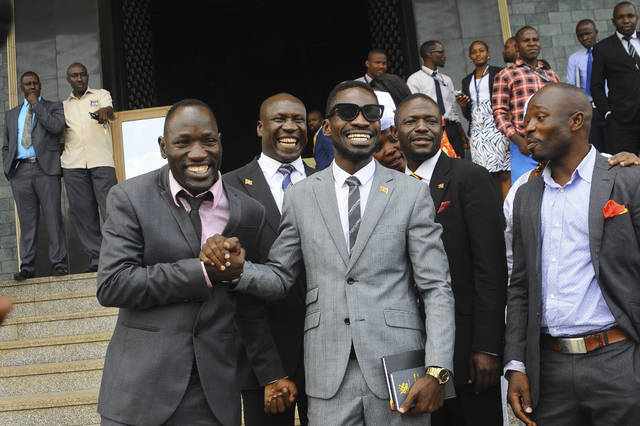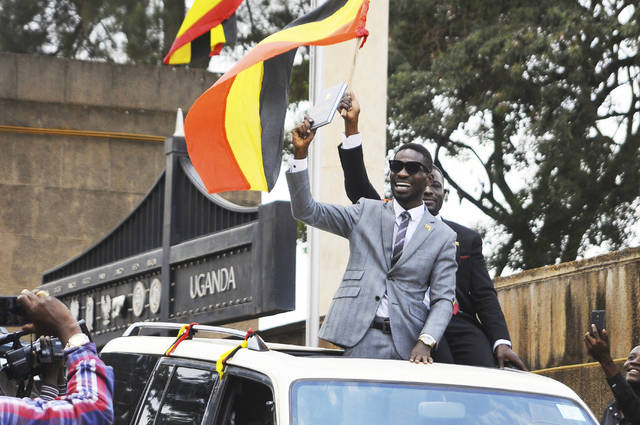In Uganda a pop star takes on a president, at his peril

ASSOCIATED PRESS
In this photo taken in 2017, Ugandan pop star Kyagulanyi Ssentamu, better known as Bobi Wine, center, gestures to supporters shortly after being sworn in as a member of parliament in Kampala, Uganda. The 36-year-old “ghetto child” is a new member of parliament who urges his countrymen to stand up against what he calls a failing government but was charged Thursday in a military court over his alleged role in clashes in the northwestern town of Arua where both he and President Yoweri Museveni were campaigning.

ASSOCIATED PRESS
In this photo taken in 2017, Ugandan pop star Kyagulanyi Ssentamu, better known as Bobi Wine, center, gestures to supporters shortly after being sworn in as a member of parliament in Kampala, Uganda. The 36-year-old “ghetto child” is a new member of parliament who urges his countrymen to stand up against what he calls a failing government but was charged Thursday in a military court over his alleged role in clashes in the northwestern town of Arua where both he and President Yoweri Museveni were campaigning.


KAMPALA, Uganda >> In his red beret and jumpsuit the Ugandan pop star Kyagulanyi Ssentamu, better known as Bobi Wine, leads cheering campaigners down a street, punching the air and waving the national flag.
Once considered a marijuana-loving crooner, the 36-year-old “ghetto child” is an unlikely new political phenomenon — and that has put him in danger as an opposition lawmaker taking on one of Africa’s longest-serving leaders. On today he alleged he was “severely tortured” by security forces during an arrest this week.
The new member of parliament has urged his countrymen to stand up against what he calls a failing government. His “Freedom” video opens with him singing behind bars: “We are fed up with those who oppress our lives.” He has protested against an unpopular social media tax and a controversial change to the constitution removing presidential age limits.
Despite murmurs about his wild past and inexperience in politics, his approach appears to be working: All of the candidates he has backed in strongly contested legislative by-elections this year have emerged victorious.
But after clashes this week led to a smashed window in President Yoweri Museveni’s convoy and Ssentamu’s own driver shot dead, some of the singer’s supporters now wonder if they’ll ever see him again.
The brash young lawmaker was charged Thursday in a military court with illegal possession of firearms for his alleged role in Monday’s clashes in the northwestern town of Arua, where both he and Museveni were campaigning. As the president’s convoy left a rally, authorities say, a group associated with Ssentamu and the candidate he supported, Kassiano Wadri, pelted it with stones.
Don't miss out on what's happening!
Stay in touch with breaking news, as it happens, conveniently in your email inbox. It's FREE!
Ssentamu quickly posted on Twitter a photo of his dead driver slumped in a car seat, blaming police “thinking they’ve shot at me.” Then he was arrested, and he hasn’t been seen in public since.
On today, limping and swollen-faced, he told visiting members of the Uganda Human Rights Commission that he had been “severely tortured” during his arrest by uniformed officers. “In spite of having surrendered, they pounced on him, hit his head with an iron bar, indiscriminately beat and kicked him all over the body until he became unconscious,” the commission’s statement said.
Army spokesman Brig. Richard Karemire didn’t address the allegation but said the military will ensure he receives medical attention “now that he is under its safe custody.”
Critics have said Uganda’s government might find it easier to get the verdict it wants in a military court, where independent observers often have limited access. Ssentamu’s wife, Barbara, told reporters he has never owned a gun and does not know how to handle one, reinforcing widespread concerns about trumped-up charges.
After seeing him in detention on today she said in a statement that he is “in such a terrible state and in urgent need of medical attention.”
The U.S. Embassy said in a statement it was “disturbed by reports of brutal treatment” of legislators and others by security forces, urging the government “to show the world that Uganda respects its constitution and the human rights of all of its citizens.” A separate statement by the European Union delegation and several other Western diplomats expressed similar concerns.
The case against Ssentamu has riveted this East African country that has rarely seen a politician of such charisma and drive. Beaten and bruised, often literally, opposition politicians have largely retreated as the 74-year-old Museveni pursues an even longer stay in power.
While Kizza Besigye, a four-time presidential challenger who has been jailed many times, appears to relax his protest movement, Ssentamu has urged bold action. The young must replace the old in Uganda’s leadership, he says.
His message resonates widely in a country where many educated young people cannot find employment, public hospitals often lack basic medicines and main roads are dangerously potholed.
With traditional avenues of political agitation largely blocked by the government, the spectacle of an entertainer with a political message offers hope to those who want change, said Mwambutsya Ndebesa, who teaches political history at Uganda’s Makerere University.
“There is political frustration, there is political anger, and right now anyone can do. Even if it means following a comedian, we are going to follow a comedian,” Ndebesa said. “Uganda is a political accident waiting to happen. A singer like Bobi Wine can put Uganda on fire.”
Running against both the ruling party and the main opposition party under Besigye, Ssentamu won his parliament seat by a landslide last year. Asked about his presidential ambitions, he told local broadcaster NBS that “it is good to imagine things, but it is better to work toward that imagination.”
Ssentamu later was among a small group of lawmakers roughed up by security forces inside the chamber for their failed efforts to block legislation that opened the door for Museveni to possibly rule for life.
“You are either uninformed or you are a liar, a characteristic you so liberally apply to me,” the president said to Ssentamu in a scathing letter published in local newspapers in October amid public debate over the law.
Museveni, who took power by force in 1986, is now able to rule into the 2030s. While his government is a key U.S. security ally, the security forces have long faced human rights groups’ allegations of abuses.
The beating of Ssentamu, however, has only boosted his popularity and led to calls for a presidential run in 2021.
“The only critical thing is how he responds to the brutality of the state,” said Asuman Bisiika, a Ugandan political analyst. “How does he respond after the physical impact of the state on his body? We are waiting.”
His trial is likely to be drawn out over months and possibly years, impeding his political activities. His followers have expressed concern that this is the government’s motive.
In the poor suburb of Kamwokya in the capital, Kampala, where Ssentamu’s musical journey began and he is fondly recalled as “the ghetto president,” some vow to fight until he is freed. Protesters on Thursday were quickly dispersed by police lobbing tear gas.
“For us, Bobi Wine is a good leader because he cares for the ordinary person and he is a truth teller,” said John Bosco Ssegawa, standing in a street where tires had been burned. “And those people whose names I will not mention think he is wrong. No, they are wrong.”



